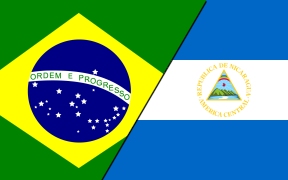By Daniel Nardini
 Last weekend, the Brazilian government expelled the Nicaraguan ambassador to Brazil after the Nicaraguan government expelled the Brazilian ambassador to Nicaragua. What is happening between the two countries? Why has this diplomatic war erupted? Truth be told, it was some time in coming. Relations between the two countries had been going downhill for some time. One example was the imprisonment of Roman Catholic Bishop Rolando Jose Alvarez by the Nicaraguan government. The Nicaraguan government under current President Daniel Ortega saw the bishop as a thorn in his side, and Ortega was more than likely to not just want the bishop imprisoned but even done away with. Brazilian President Luiz Inacio Lula da Silva, at the request of Roman Catholic Pope Francis, tried to get the bishop released. Eventually Bishop Alvarez was released, but the Nicaraguan government forcibly sent the bishop out of the country into exile—-a clear slap in the face to President Lula.
Last weekend, the Brazilian government expelled the Nicaraguan ambassador to Brazil after the Nicaraguan government expelled the Brazilian ambassador to Nicaragua. What is happening between the two countries? Why has this diplomatic war erupted? Truth be told, it was some time in coming. Relations between the two countries had been going downhill for some time. One example was the imprisonment of Roman Catholic Bishop Rolando Jose Alvarez by the Nicaraguan government. The Nicaraguan government under current President Daniel Ortega saw the bishop as a thorn in his side, and Ortega was more than likely to not just want the bishop imprisoned but even done away with. Brazilian President Luiz Inacio Lula da Silva, at the request of Roman Catholic Pope Francis, tried to get the bishop released. Eventually Bishop Alvarez was released, but the Nicaraguan government forcibly sent the bishop out of the country into exile—-a clear slap in the face to President Lula.
From there it only got worse. The Brazilian government this year instructed its ambassador to not attend the 45th anniversary of the victory of the Sandinista revolution over former president and dictator Anastasio Somoza Debayle in 1979. It was an obvious snub to both President Ortega and the Sandinistas by he Brazilian government. This was probably in retaliation over the fact that after the whole incident with Bishop Alvarez, President Ortega has never spoken again with President Lula. According to President Lula, President Ortega never returned his phone calls and text messages, which is official custom between heads of state. This snub by President Ortega has simply meant that relations between the two presidents, and indeed the two countries, has gone downhill. Another consideration has been the suppression of Nicaragua’s internal opposition and the fact that tens of thousands of Nicaraguans were forced to flee the country. Brazil, being a democracy, has found Ortega’s dictatorship distasteful.
When President Ortega personally ordered the expulsion of the Brazilian ambassador, President Lula simply followed suit and expelled the Nicaraguan ambassador. One other point of contention between the two countries has been the election in Venezuela. Clearly, the Nicaraguan government congratulated current president and dictator Nicolas Maduro on winning the election. President Lula has so far not recognized Maduro as the winner, and has called for a recount of the election ballots as well as a release of the actual ballot count. President Lula is in a dilemma on this one. Brazil borders Venezuela, and he does not want a conflict with the Venezuelan government nor more Venezuelan refugees pouring into Brazil. Hence, Brazil’s stance has been more of a neutral one. But clearly the stance between the Nicaraguan government on the one hand and the Brazilian government on the other in regards to Venezuela is just one more indication of the irreconcilable differences between the two countries. We are seeing a diplomatic war, and from what I can see this is as far as it is likely to go. Because these two countries do not border each other, actual war is not likely. That is probably the only positive thing that I see to this intense animosity between Brazil and Nicaragua.
 Ease the Holiday Blues with CDPH Programs December 19, 2025
Ease the Holiday Blues with CDPH Programs December 19, 2025
 Rogers Park Business Alliance Expands Annual Live Love Shop Rogers Park December 18, 2025
Rogers Park Business Alliance Expands Annual Live Love Shop Rogers Park December 18, 2025






The Diplomatic War Between Brazil and Nicaragua
By Daniel Nardini
From there it only got worse. The Brazilian government this year instructed its ambassador to not attend the 45th anniversary of the victory of the Sandinista revolution over former president and dictator Anastasio Somoza Debayle in 1979. It was an obvious snub to both President Ortega and the Sandinistas by he Brazilian government. This was probably in retaliation over the fact that after the whole incident with Bishop Alvarez, President Ortega has never spoken again with President Lula. According to President Lula, President Ortega never returned his phone calls and text messages, which is official custom between heads of state. This snub by President Ortega has simply meant that relations between the two presidents, and indeed the two countries, has gone downhill. Another consideration has been the suppression of Nicaragua’s internal opposition and the fact that tens of thousands of Nicaraguans were forced to flee the country. Brazil, being a democracy, has found Ortega’s dictatorship distasteful.
When President Ortega personally ordered the expulsion of the Brazilian ambassador, President Lula simply followed suit and expelled the Nicaraguan ambassador. One other point of contention between the two countries has been the election in Venezuela. Clearly, the Nicaraguan government congratulated current president and dictator Nicolas Maduro on winning the election. President Lula has so far not recognized Maduro as the winner, and has called for a recount of the election ballots as well as a release of the actual ballot count. President Lula is in a dilemma on this one. Brazil borders Venezuela, and he does not want a conflict with the Venezuelan government nor more Venezuelan refugees pouring into Brazil. Hence, Brazil’s stance has been more of a neutral one. But clearly the stance between the Nicaraguan government on the one hand and the Brazilian government on the other in regards to Venezuela is just one more indication of the irreconcilable differences between the two countries. We are seeing a diplomatic war, and from what I can see this is as far as it is likely to go. Because these two countries do not border each other, actual war is not likely. That is probably the only positive thing that I see to this intense animosity between Brazil and Nicaragua.